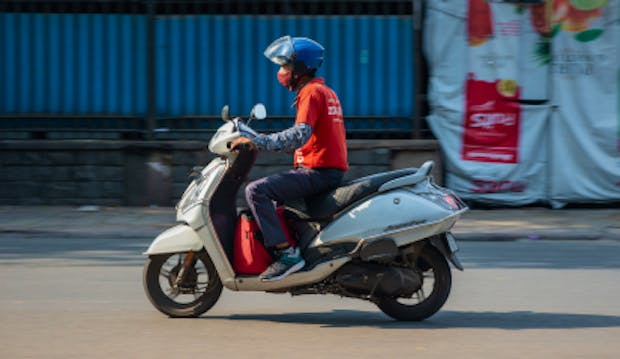Quick Commerce is catching up, fast

express deliveries are becoming sought-after, making Q-Com an attractive space for startups and consumer goods firms.
after a tiring day at work, there is always a worrisome question. what can you make effortlessly in under 10 minutes? maggi, porridge, maybe coffee? you could get food delivered, but that also takes 30 minutes or more. Zomato is now offering a solution. it has taken a big leap to deliver select food items in 10 minutes. so, you could eat not just a plate of maggi, but idli, poha, momos, and even biryani, exactly when the hunger pangs strike.
Zomato’s new offering is just an extension to the trend of quick grocery deliveries. need a bottle of olive oil or coriander for a garnish? running to a supermarket is no longer necessary. startups will deliver them in a jiffy.
the quick commerce competition in the market is so aggressive and fast growing, it started with delivery within 24 hours, then moved to 12 hours, and now is down to a few minutes.
a Redseer report estimates India’s quick commerce market will grow 15 times to $5.5 billion by 2025 from the current $700 million. this market size would put India ahead of other leading markets, such as China, in terms of quick commerce adoption.
the burgeoning q-commerce market that is dominated by startups such as Swiggy (Instamart), Zepto, Dunzo, and Blinkit, is now forcing bigger companies to take notice.
swift to home
a recent phenomenon in India, it all began during the pandemic when individuals were anxious about going out. that’s when q-commerce stepped in.
Swiggy launched its Instamart service in 2020, attempting to deliver household essentials in just 45 minutes. the food aggregator partnered with local stores to source products, pack, and deliver.
hyper-local delivery startup Dunzo made the shift next, introducing an under-19-minutes service in early 2021.
then two Mumbai teens proposed that delivery times could be brought down further. and in April 2021, the duo launched a hyper-local delivery service called Zepto. this venture promised deliveries in just 10 minutes and this changed the grocery space.
just a few months later, Zepto raised $100 million, with valuation doubling to $570 million. its secret was the dark stores set up across cities that stock up products for instant deliveries.
FOMO hit Grofers, and they joined the bandwagon too. Grofers was later rebranded as Blinkit, indicating a complete transition to quick commerce.
considering that q-commerce is too big an opportunity to miss, even startups such as Amazon, Flipkart, and Tata-backed BigBasket have entered the segment. BigBasket now offers a service called ‘BB Now’, delivering in 15-30 minute. Flipkart, through Flipkart Quick, is scaling up its 45-minute delivery service.
Amazon, too, is offering two-hour delivery for its pantry items under the Amazon Fresh umbrella.
the RedSeer report said that quick commerce is currently 13% of the $5.5 billion online grocery industry. speed is the key differentiator for customers shopping for online groceries.
taking the acquisition route
instead of setting up a q-commerce entity from scratch, larger companies such as Reliance Industries and the Tata Group have opted to invest in startups that are already powerful brands.
Reliance Retail bought a 25.8% stake in Dunzo for $240 million, making a formal entry into the q-commerce space in January 2022. this deal also made Reliance its largest shareholder, coinciding with RIL’s super-app launch.
through this capital raising, Dunzo will expand its dark store capacity and also build on its drone capacities for even faster deliveries. the company had already tested using drones to deliver vaccines and medicines under pilot projects.
in May 2021, Tata Digital had bought a 64% stake in the grocery platform BigBasket, valuing the startup at $2 billion.
Tata Neu, the Tata Group's super-app set to be launched in April 2022, will feature BigBasket’s BB Now service. here, BBNow will stock up the top-selling essentials and utilise BigBasket’s existing dark stores’ network for brisk deliveries.
as metro cities such as Bengaluru, Delhi, and Mumbai lead the switch to quick commerce, competition is only expected to intensify.
the RedSeer report indicates that it will be unplanned purchases that will drive the growth of quick commerce in the country. this segment also boasts of a higher Net Promoter Score, a metric measuring customer loyalty and satisfaction.
with an estimated 900 million internet users in India by 2025, q-commerce services are only waiting to penetrate deeper into the country’s heartland. having convenience at its core, and legacy brands backing these ventures, warehouse capacity will only grow further, leading to drastic reductions in already-low delivery times. the customers are the real winners.



